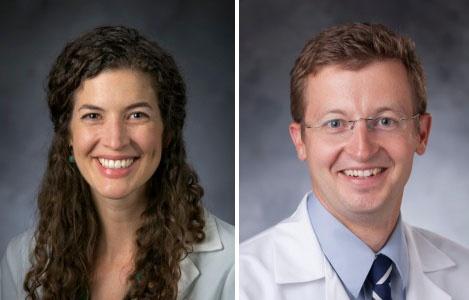
Every spring the Duke University School of Medicine recognizes the achievements of a number of our colleagues with the presentation of School of Medicine faculty awards. This year's faculty awards will be presented at the annual School of Medicine Spring Faculty Celebration on Tuesday, May 10 from 5:00 to 7:30 pm at Duke Gardens.
Congratulations to Dorothy Dow, MD, MSc and Christoph Hornik, MD, PhD, MPH on this well-deserved honor!
Ruth and A. Morris Williams Faculty Research Prize
The Ruth and A. Morris Williams Faculty Research Prize was established to advance research opportunities for younger faculty members and to help publicize the caliber of medical research underway at Duke. The Williams Prize recognizes groundbreaking research in basic or clinical science in alternate years. In rare circumstances, two prizes may be awarded by splitting the amounts equally. Applicants must be School of Medicine faculty who are 10 years or fewer from first faculty appointment at assistant professor level at any institution. The intent is to honor and reward groundbreaking research that has substantially been conducted at Duke.
Dorothy Dow, MD, MSc
Assistant Professor of Pediatrics
Division of Infectious Diseases
Assistant Research Professor of Global Health
Dorothy Dow, MD, MScGH is an assistant professor of pediatrics and assistant research professor at the Duke Global Health Institute. Dr. Dow’s research focuses on prevention and treatment of HIV in pediatric populations including prevention of mother-to-child transmission and a focus on adolescent and young adult populations. She is co-chair of IMPAACT Network Protocol 2016 and a member of the AHISA network. She is co-site leader of the Kilimanjaro Christian Medical Centre-Duke University Collaboration where she works nearly full time in Moshi, Tanzania, although she returns to Duke University Medical Center two-weeks twice per year to attend on the clinical inpatient consult service. She believes children are our future, and takes pride in providing excellent health care for the pediatric population across the spectrum of infectious and tropical diseases.
Christoph Hornik, MD, PhD, MPH
Associate Professor of Pediatrics
Division of Critical Care Medicine
Chief, Division of Quantitative Sciences
Vice Chair, Research
Dr. Hornik came to Duke in 2005 as a Pediatrics resident, followed by fellowship training in pediatric cardiology and critical care medicine. He joined the faculty in 2013 and is currently a member of the Division of Pediatric Critical Care Medicine, chief of the Division of Quantitative Sciences, and vice chair for Research. He earned an MPH in biostatistics from the University of North Carolina at Chapel Hill and received his PhD in pharmaceutical sciences from the University of North Carolina Eshelman School of Pharmacy.
Dr. Hornik spends the majority of his time as a clinical researcher with a secondary appointment at the Duke Clinical Research Institute (DCRI). There, his work focuses on applying clinical pharmacology, biostatistics, and innovative trial methods to drug development for critically ill children. He also serves as the director of the DCRI’s Pharmacometrics and Small Trials Program. In this role, he guides a team of pharmacometricians who provide clinical pharmacology and pharmacometrics services to sponsors and investigators, and a team of cross-trained project leaders, who operationalize smaller single and multicenter trials using innovative and efficient operational principles.
Clinically, he attends as part of the multidisciplinary team caring for infants and children with cardiac disease in the pediatric cardiac intensive care unit. Trained in both pediatric cardiology and critical care medicine, he works closely with colleagues from pediatric cardiology, anesthesia, and pediatric cardiac surgery. His team includes critical care and cardiology fellows, as well as an outstanding group of critical care nurse practitioners. Together, they provide essential peri-operative care, and manage children with critical medical cardiac disease including acute heart failure.